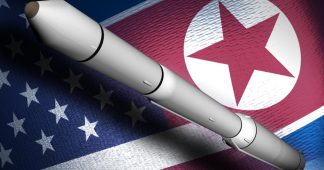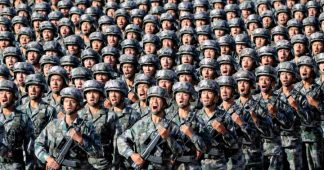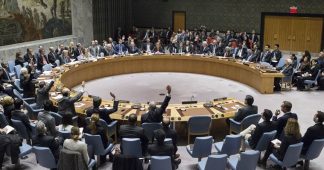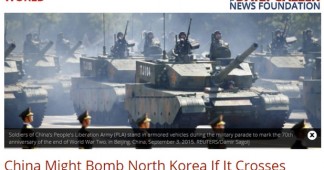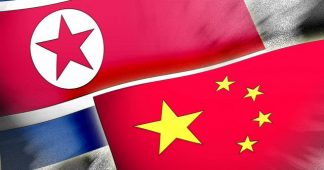By James Cogan
9 November 2017
China’s feting of US president Donald Trump this week speaks volumes about the class interests being served by the regime headed by the Chinese Communist Party (CCP) and its “paramount leader,” Xi Jinping. Trump, a billionaire chauvinist and advocate of trade war and military confrontation with China, has been accorded the highest state honors by the corrupt representatives of the Chinese capitalist oligarchy.
Yesterday, children waving American and Chinese flags greeted Trump at the Beijing airport. Along with First Lady Melanie Trump, he was driven immediately to the Forbidden City, the former palace of the Chinese emperors, for a private, guided tour with Xi and his wife, along with staged photographs and an “afternoon tea.” In the evening, following a banquet and a performance of Chinese opera, a child actor, swept up in the adoration of the US president, exclaimed to him, “I love you!”
Today, Trump was accorded an open-air “welcome ceremony” in front of the Great Hall of the People in Tiananmen Square, complete with a military guard of honor, the presence of dozens of the highest ranking CCP officials, and more children waving the Stars and Stripes.
This official obsequiousness has been duplicated in the state-controlled media. The Global Times, which often publishes Chinese nationalist denunciations of US foreign policy, wrote in its editorial today:
“Trump is one of the most popular heads of state on the Chinese internet, and generally the Chinese public holds a positive attitude toward him… It wasn’t until his election victory that the Chinese public realized they had been cheated by the American media. Many leading US media outlets are now discredited among the Chinese public, partly because of their fake reports during the elections and subjective opposition against Trump…. Chinese appreciate his directness, which is sharp contrast to Hillary Clinton, who always puts on airs… He has also showed his respect for China’s leader, publicly praising President Xi Jinping several times…”
The “Chinese public”—that is, the country’s multi-millioned working class and rural poor—has been left largely in the dark about Trump’s ultimatum, delivered just hours before he arrived in Beijing, that the US will attack North Korea if it fails to dismantle its nuclear and missile programs.
Preparation for war with North Korea, on the pretext that it poses a “worldwide threat,” has been at the forefront of Trump’s 12-day tour of the Asian region. It was the key issue discussed during his visits to Japan and South Korea, and will be a main agenda item in the behind-closed-door talks in China. It will also dominate the Asia-Pacific Economic Cooperation forum (APEC), which convenes in Vietnam on Friday, and the East Asia Summit (EAS), which will take place in the Philippines on Monday.
The signal emanating from Beijing is that, despite its formal military alliance with North Korea, it is prepared to throw the Pyongyang regime to the wolves. The response of the Chinese foreign ministry to Trump’s speech in South Korea was to declare that China was “committed to realising the denuclearisation of the Korean peninsula” and “resolving the issue through dialogue and consultation.”
It is likely that Beijing is applying immense pressure on North Korea to bow down to US dictates and strip the Trump administration of its pretext for war. Thus far, the response from Pyongyang has been to denounce Trump as a “mad dog,” and call for the “lunatic old man” to be ousted as US president.
The strategic orientation of the Chinese regime is to avoid an open clash with Washington for as long as possible, combined with concerted efforts to expand its economic and diplomatic influence at the expense of US imperialism.
In what appears to be an attempt to forestall Trump’s protectionist threats, Chinese conglomerates have committed, during his visit, to large-scale investments in the US and purchases of American products.
According to Bloomberg sources, Commerce Secretary Wilbur Ross gloated yesterday to the American business heads accompanying Trump to China, that up to $250 billion in US-based projects and trade agreements could be signed.
Bloomberg has reported the details of some of these deals. The state-owned Chinese Investment Corp will contract with Goldman Sachs to invest as much as $5 billion in American energy company stocks. Mobile phone corporation Xiaomi will partner with US-based Qualcomm. Sinopec, the massive state-owned Chinese energy corporation, will invest as much as $7 billion in Texas oil and gas fields. Chemical company Sinochem will partner with Alaska Gasline Development. General Electric will receive investment funds from the Industrial and Commercial Bank of China.
Other deals include Chinese online retailer JD.Com entering into contracts to purchase up to $2 billion in US beef, pork and other commodities; the US Soybean Council has been granted additional exports; US transnational Honeywell International has reportedly signed a service agreement with Spring Airlines—the largest Chinese budget airline—and a memorandum of understanding to process ethane with Oriental Energy; Bell Helicopter and Caterpillar are receiving additional orders from Chinese companies.
The underlying conflict between the US and China over hegemony in the Asia-Pacific region, will nevertheless emerge sharply at APEC and the EAS.
At both summits, the Trump administration, which has repudiated the planned Trans Pacific Partnership (TPP) trading bloc, to the dismay of its allies such as Japan and Australia, is issuing threats of trade war if Asian countries do not purchase more American exports.
China, in contrast, will be offering regional states expanded trade and investment opportunities, through the proposed Regional Comprehensive Economic Partnership (RCEP), a rival bloc to the TPP, which excludes the United States. It is also seeking to draw countries into its orbit through involvement in its massive “One Belt One Road” projects, aimed at developing a network of energy and transport links between Asia and Europe, which likewise marginalises the US.
The US is being propelled toward military confrontation with China by the struggle over dominance of resources, markets and profits. War against North Korea is viewed, in American strategic circles, as a means of both changing the balance of forces in the region, and of positioning Washington for what it views as inevitable war with China itself.
